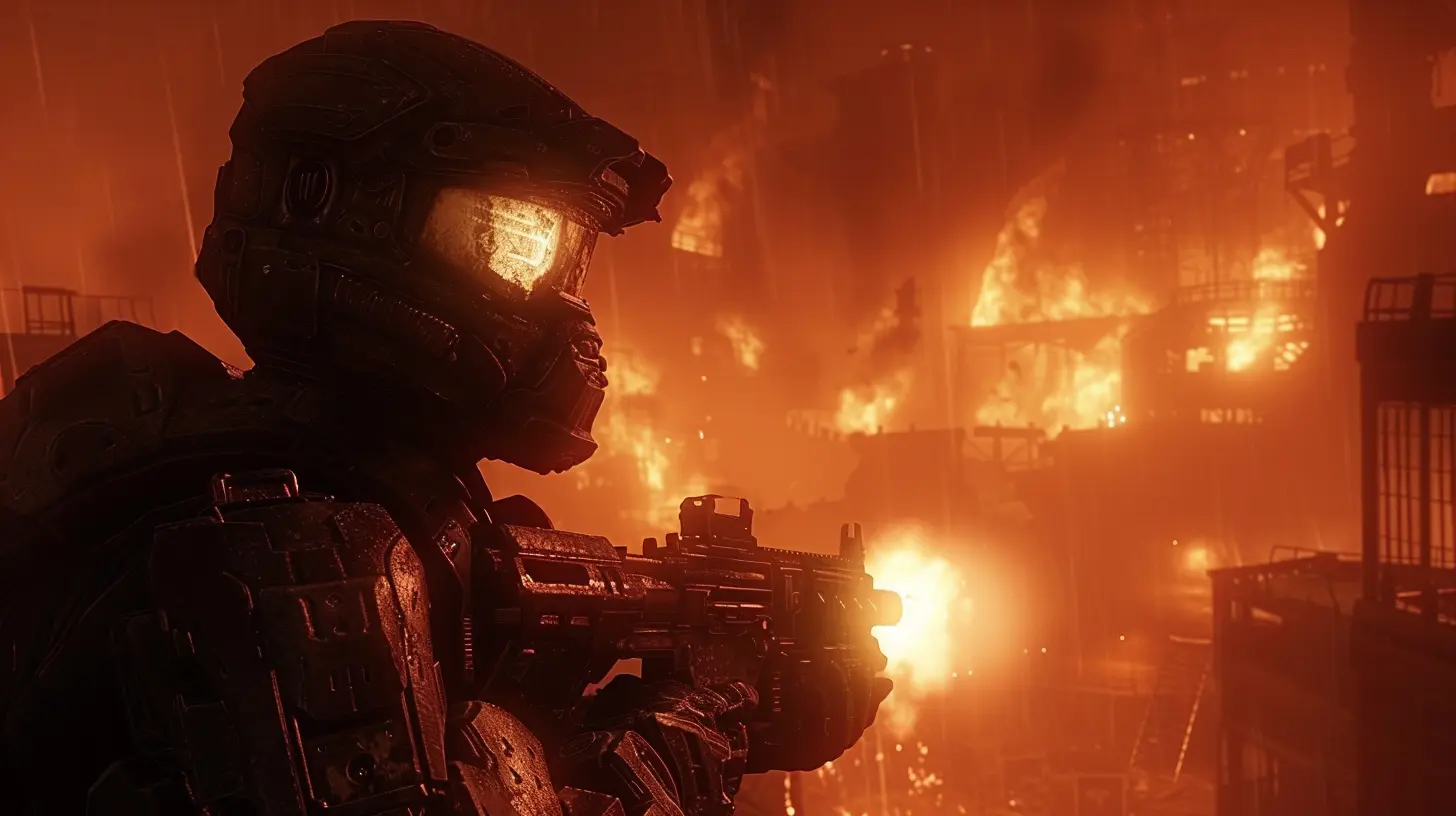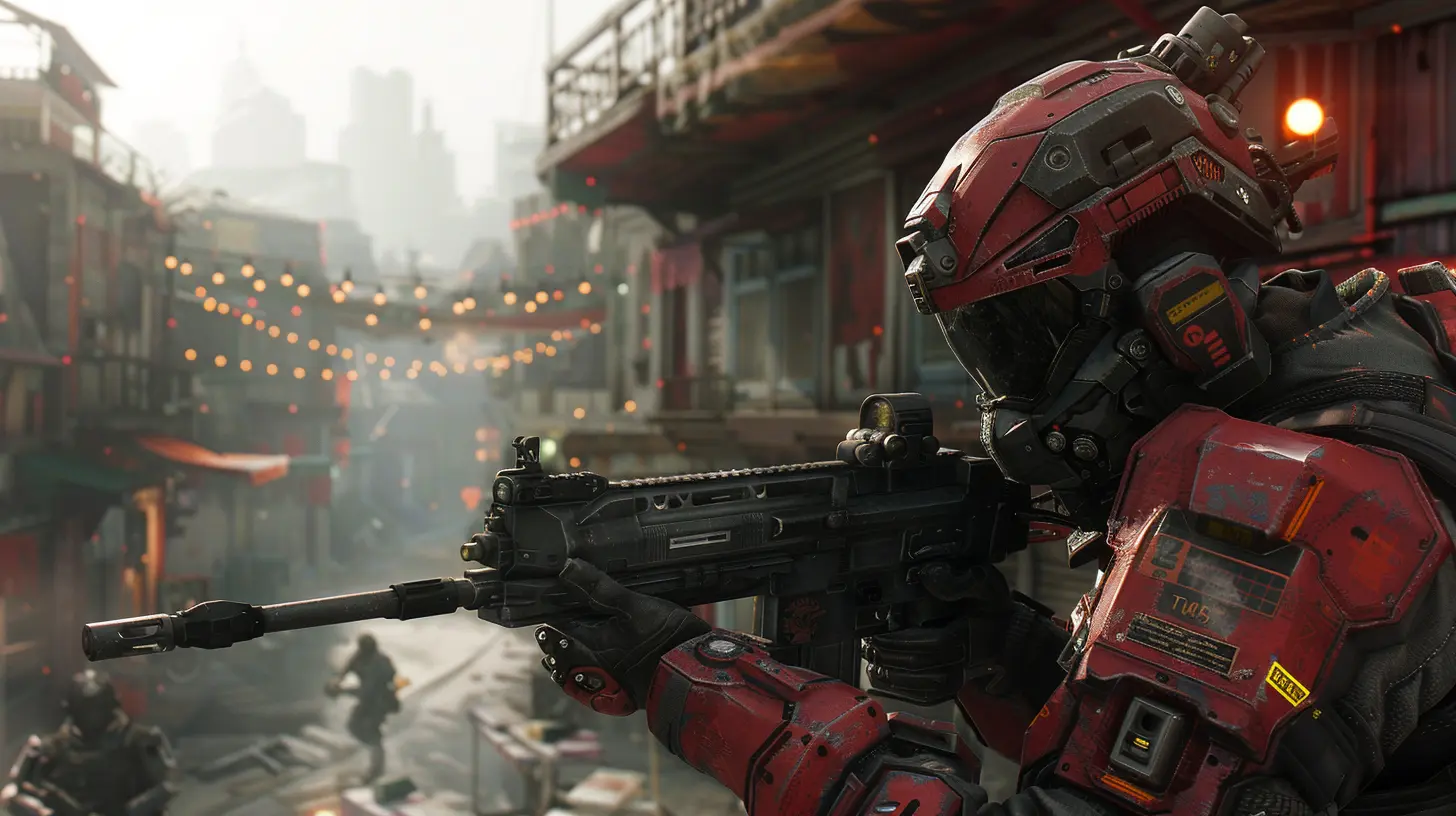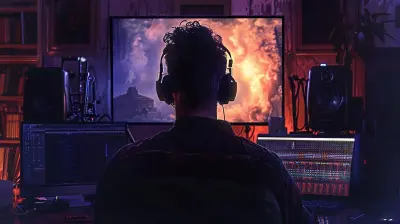First-Person Shooters and the Limited Role of Voice Acting
16 December 2024
Ever wondered why some first-person shooters (FPS) feel so immersive, yet the characters’ voices remain minimal or almost non-existent? You’re not alone. While FPS games have evolved in countless ways—better graphics, smoother mechanics, and realistic environments—the role of voice acting often lags behind or feels sidelined. Let’s dive deep into why that happens and how it ties into the very essence of what makes first-person shooters tick.

The Core of FPS Games: You Are the Character
First things first, let’s get one thing straight. When you play a first-person shooter, you’re not watching a character—you ARE the character. Unlike third-person games where you’re more of an observer guiding someone else's journey, FPS games drop you right into the boots of the protagonist.This perspective is immersive by design. It’s supposed to feel like you’re the one holding that rifle, sneaking through enemy bases, or dodging a sniper’s bullet. But here’s the catch: voice acting can mess with that illusion.
Think about it. If your character suddenly starts talking out loud, saying things you wouldn’t say, doesn’t that break the immersion? Imagine playing "Call of Duty" and your character yells out, in a thick accent, “Let’s blow these guys to smithereens!” when, in your head, you're thinking, Wait, calm down, I was going to sneak through. That kind of disconnect can pull you out of the experience faster than getting sniped.

Why Voice Acting Is Minimal in FPS Games
1. Immersion Over Interaction
The whole goal of most FPS games is to make you feel like the world revolves around you. It’s a carefully crafted illusion. Your reactions, your movements—they’re key. Adding a fully-voiced character might detract from your ability to project yourself into the game world.For example, in games like “Half-Life” or “DOOM,” the silence of Gordon Freeman or the DOOM Slayer doesn’t feel like a lack of personality. Instead, it gives you space to interpret their thoughts, motivations, and emotions. A silent protagonist becomes a mirror for the player’s imagination, and that’s exactly the point.
2. Gameplay Is King
Let’s be real—most of us hop into an FPS for the action, not the chatter. The genre is designed to prioritize fast-paced gameplay, tense shootouts, and strategic decision-making. Adding elaborate dialogue scenes or unnecessary banter could slow things down.Take “Counter-Strike” or “Rainbow Six Siege,” for instance. These games rely heavily on teamwork and strategy. In these scenarios, the only voice acting you hear is usually from your squad mates calling out enemy positions or objectives. Why? Because anything else would distract from what’s important—your performance on the battlefield.
3. Budget Considerations
Here’s something you might not have thought about: voice acting is expensive. Hiring professional voice actors, recording in high-quality studios, and syncing those lines with in-game animations—all of that costs money.Developers often have to make trade-offs. Would you rather they spend their budget perfecting the sound of gunfire, the way glass shatters, or enemy AI mechanics, or on recording hundreds of lines for a character you barely see? Most FPS devs decide that immersive gameplay is the better investment.
4. Online Multiplayer Shifts the Focus
A lot of modern FPS titles lean heavily toward multiplayer modes. Games like “Apex Legends,” “Overwatch,” and “Call of Duty: Warzone” are built around player-versus-player (PvP) combat.In these environments, voice acting for your character often feels irrelevant. After all, in multiplayer, your squadmates (real human players) are the voices you care about most. Why bother scripting dialogue for your character when you’re too busy communicating with your team over voice chat?

When Voice Acting Does Shine in FPS Games
With all that said, voice acting isn’t entirely absent from FPS games. In fact, when done strategically, it can add a lot to the experience. Let’s look at a few examples:1. Story-Driven FPS Games
Games like “Bioshock Infinite” and “Deathloop” embrace voice acting to enhance their storytelling. These games rely heavily on narrative and character development, so it makes sense for the protagonist and supporting characters to be fully voiced.In “Deathloop,” for example, Colt and Julianna’s exchanges give the game flavor and personality, turning what could’ve been a generic shooter into something uniquely memorable. Voice acting in these cases works because it complements the story without overwhelming gameplay.
2. Specialized Multiplayer Characters
When FPS games feature heroes or champions with distinct roles—like in “Overwatch” or “Valorant”—voice acting becomes a tool for characterization. Those witty one-liners or quirky voice cues make the characters stand out. Sure, it’s a smaller-scale implementation, but it’s impactful. Hearing Tracer’s cheerful “Cheers, love!” in “Overwatch” instantly tells you a lot about her personality without requiring a lengthy cutscene.3. Supporting Characters Taking the Lead
Sometimes, it’s not about the protagonist but the people around them. In games like “Halo” or “Far Cry,” supporting characters like Cortana or Vaas help carry the narrative, while the protagonist remains either silent or minimally voiced. This approach keeps the player immersed while still delivering an engaging story.
The Balance Between Silence and Speech
So, does voice acting belong in first-person shooters? The answer isn’t black and white. It depends on what kind of experience the game strives to deliver. FPS games have a tightrope to walk—balancing immersion, gameplay, and storytelling without one taking over the other.While some players might crave more voice-acted moments to bring characters to life, others appreciate the blank slate that silence offers. After all, every gamer is different. Some want a cinematic experience, while others just want to shoot stuff and blow things up. Both are valid!
The Future of Voice Acting in FPS Games
Looking ahead, it’s likely we’ll see voice acting evolve rather than disappear in FPS games. With advancements in AI and machine learning, developers might be able to generate dynamic, reactive dialogue tailored to how you’re playing the game. Imagine a world where your character’s voice lines change based on your decisions, combat style, or even mood. Sounds cool, right?Still, the core question will remain: how much voice acting is too much? Because at the end of the day, the magic of first-person shooters lies in the illusion they create—that you’re right there, in the thick of it.
Wrapping It All Up
First-person shooters and voice acting have a complicated relationship. While silence often works to enhance immersion and gameplay, there’s also room for thoughtfully placed dialogue to enrich the experience. Whether it's a completely silent protagonist or a chatterbox hero, the goal is always the same: keep the player engaged and in the zone.So next time you pick up a controller or sit down with your mouse and keyboard, take a moment to appreciate the careful balance developers strike. Because in the world of FPS games, sometimes less is more—and sometimes, a well-timed voice line is exactly what you need to feel alive in the game.
all images in this post were generated using AI tools
Category:
Voice Acting In GamesAuthor:

Whitman Adams
Discussion
rate this article
9 comments
Zara McGinnis
While voice acting enhances narrative depth, many first-person shooters prioritize gameplay mechanics over dialogue. This approach often leads to immersive experiences driven by action rather than storytelling, allowing players to create their own narratives.
January 28, 2025 at 4:59 PM

Whitman Adams
I appreciate your insight! It's true that while gameplay mechanics often take center stage in first-person shooters, this allows players to craft their own unique stories within the action.
Fallon McFarlin
This article highlights an often-overlooked aspect of first-person shooters. While gameplay is crucial, the minimal role of voice acting can undermine character depth and narrative engagement. Striking a balance could elevate these games beyond mere mechanics and into memorable storytelling.
January 23, 2025 at 4:55 PM

Whitman Adams
Thank you for your insights! I agree that enhancing voice acting can significantly enrich character depth and storytelling in first-person shooters.
Delta McClendon
Great read! It's fascinating how FPS games rely on action over dialogue. Here's to the thrill of gameplay! Sometimes, silence speaks volumes. Keep up the awesome work!
January 19, 2025 at 3:39 PM

Whitman Adams
Thank you! I'm glad you enjoyed the piece. The balance of action and sparing dialogue is indeed what makes FPS games uniquely thrilling!
Valencia Elliott
Great insights! Voice acting in FPS games often takes a backseat, but its impact on immersion shouldn’t be underestimated.
January 7, 2025 at 4:41 PM

Whitman Adams
Thank you! I completely agree—voice acting plays a crucial role in enhancing immersion, even in genres where it's often overlooked.
Zaylee Cannon
Voice acting in first-person shooters often mirrors the player's isolation, creating a hollow narrative. While immersion thrives in silence, it begs the question: can the medium truly convey depth without a voice to guide us?
December 27, 2024 at 3:51 AM

Whitman Adams
While voice acting can enhance character depth, the silence in first-person shooters often amplifies player immersion, allowing personal interpretation and fostering a more profound connection with the game world.
Katie Martin
This article beautifully highlights the often-underappreciated impact of voice acting in first-person shooters. It's a crucial element that enhances emotional engagement and storytelling.
December 22, 2024 at 3:37 PM

Whitman Adams
Thank you for your insightful comment! I completely agree that voice acting plays a vital role in enriching the emotional depth and storytelling in first-person shooters.
Maisie Foster
While first-person shooters prioritize immersive gameplay and visual storytelling, the limited role of voice acting often reduces character depth and emotional connection. This paradox highlights a critical tension: can the silent protagonist truly convey the complexities of human experience in a medium driven by action?
December 20, 2024 at 4:22 PM

Whitman Adams
Indeed, the silent protagonist presents a unique challenge in conveying emotional depth, often relying on environmental storytelling and player interpretation to bridge the gap between action and character connection.
Finn White
Voice acting often feels underutilized in FPS games, overshadowed by gameplay, hindering narrative depth.
December 18, 2024 at 4:30 AM

Whitman Adams
I appreciate your perspective! While gameplay is a priority in FPS games, enhancing voice acting could significantly enrich storytelling and player immersion. It's a balance that developers should consider more.
Fenn McWhorter
Voice or no voice, let the fun shoot on!
December 16, 2024 at 4:26 PM

Whitman Adams
Absolutely! The thrill of gameplay often speaks louder than words.
MORE POSTS

Behind the Curtain: The Voice Direction Process in Video Game Development

How Open World Games Redefined Player Freedom

Writing Complex Moral Dilemmas: RPG Scenarios with No Right Answer

Top Visual Mods to Make Your Games Look Stunning

How to Keep Track of the Latest Epic Games Store Exclusive Releases

Skill Trees Explained: Mastering the Art of RPG Character Progression

How to Make the Most of Cross-Platform Gaming on Consoles